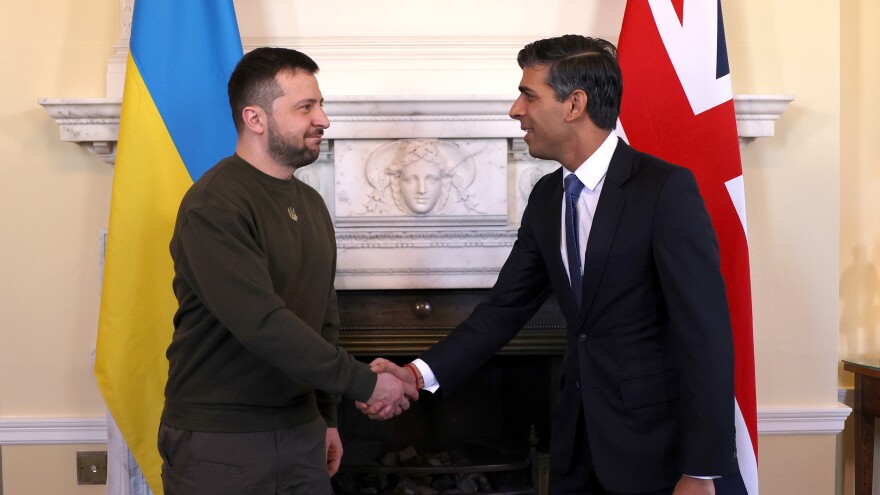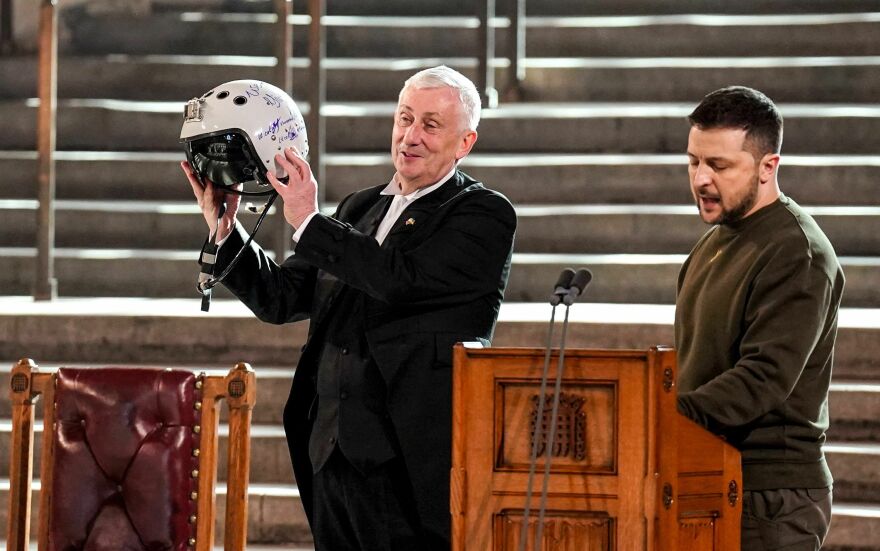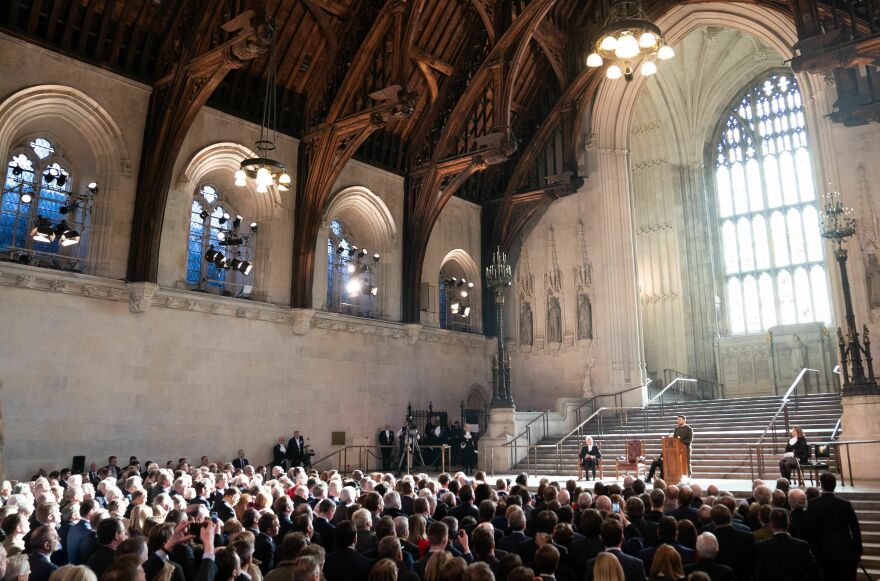Updated February 8, 2023 at 2:02 PM ET
LONDON — Ukrainian President Volodymyr Zelenskyy has made a surprise visit to the United Kingdom, one of his very rare trips outside Ukraine since Russia invaded the country nearly one year ago.
Zelenskyy is seeking more advanced weapons from one of Ukraine's strongest international backers as the Ukrainian military prepares for an anticipated Russian offensive and potential Ukrainian counterattacks to reclaim territory.
The Ukrainian leader met with Prime Minister Rishi Sunak and delivered a speech to the British Parliament, thanking the U.K. for its support and weaponry, then promptly requested even more — especially fighter jets. He also met with King Charles III.
The trip is the first leg of an unannounced European tour for Zelenskyy — as the French government has just confirmed he will be visiting Paris later Wednesday for dinner with French President Emmanuel Macron and German Chancellor Olaf Scholz. On Thursday, Zelenskyy may also travel to Brussels for meetings with other European Union leaders, after the office of the EU Council President Charles Michel invited him.
Here's why Zelenskyy made this rare visit to the U.K.
Ukraine's second-biggest backer

After the United States, the U.K. is Ukraine's second-largest donor: It has committed more than $2.7 billion worth of military assistance to Ukraine since February 2022 and pledges to match that this year, according to the British Parliament. The U.K. has played a key role in slapping Russia with economic sanctions over its invasion. And Prime Minister Sunak, like his predecessors, has also visited Kyiv.
In one of the latest shows of support, Sunak promised last month to send Ukraine Challenger 2 tanks — two weeks before the U.S. and Germany announced their tank donations. Ukrainian troops arrived in Britain Jan. 29 for training on the British battle tanks.
But Ukraine has now gone a step further: pushing for warplanes.
Ukraine's air defense has largely prevented Russia from dominating the airspace over wide areas of the country. But it has few remaining operational aircraft in its own hangars that are not reliant on Soviet-era spare parts, according to Neil Melvin, international security director at British think tank the Royal United Services Institute. He says without greater adoption of Western aircraft systems, Ukrainian forces will struggle in the long term to match the offensive ambition of their land forces in the air.
Britain promised warplane training, but so far no jets

Zelenskyy continued a tactic he has used with other countries, like the U.S. in December, seeking approval from lawmakers, who decide on defense spending.
During his speech Wednesday in Westminster Hall, he gave a symbolic gift to House of Commons Speaker Lindsay Hoyle: a fighter pilot's helmet with the words, "We have freedom, give us wings to protect it."
The U.K. government announced it would extend its military training for Ukrainian forces to include fighter jet pilots. "The training will ensure pilots are able to fly sophisticated NATO-standard fighter jets in the future," the government said in a statement.
The pledge fell short of committing to provide warplanes, yet.
But according to Reuters, a government spokesperson told reporters that "the prime minister has tasked the defense secretary with investigating what jets we might be able to give, but to be clear this is a long-term solution, rather than a short-term capability which is what Ukraine needs most now."
Maintaining public support

The image of this wartime president, dressed in his usual army green sweatshirt, amid the costumes and ceremonial robes of Britain's centuries-old Parliament will serve as a reminder to the British public of Ukraine's military needs.
U.K. public support for Ukraine in its fight with Russia remains high. So does its concern for the country's population, exemplified by the tens of thousands of Britons who welcomed Ukrainian families into their homes in the war's first few months.
An Ipsos poll published Jan. 24 said Britons express stronger support than most countries surveyed for continued efforts to help the Ukrainians and isolate Russia.
Zelenskyy seems not to take that support for granted. This visit may well be intended to remind the British public, as well as its politicians, that the war is far from over.
Alex Leff contributed to this story from Washington.
Copyright 2023 NPR. To see more, visit https://www.npr.org.


